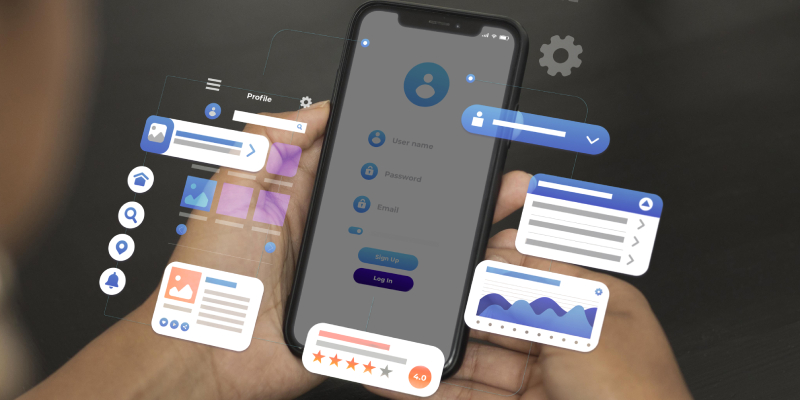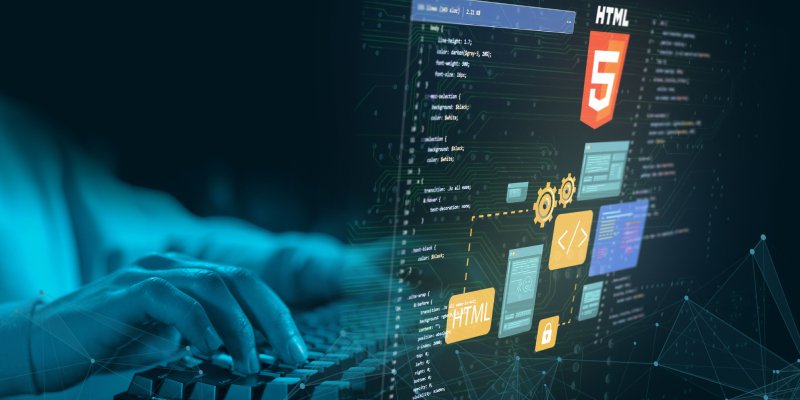In today’s rapidly evolving digital landscape, the world of technology offers an array of opportunities for innovation. Among the most prominent fields in this realm are web development and App development. These two areas play a crucial role in shaping the digital experiences of users and enabling businesses to thrive in the online space.
In this comprehensive article, we’ll delve into the differences between Web Development vs Android Development, uncovering their nuances, benefits, and the essential skill sets needed to excel in each domain.
Overview of Web Development vs Android Development
The digital landscape of today’s world demands a strong online presence from individuals and businesses alike. Web development and Android development have emerged as key players in this arena, facilitating the creation of websites, web applications, and mobile apps.
Let’s explore the complexities of these fields, providing insights into their fundamental aspects and shedding light on the skills required to excel in them.
Definitions & Types: Web Vs Android Development
Let’s Learn the essential differences between web and Android development, uncovering their unique definitions, methodologies, and diverse types of applications they empower.
Understanding Web Development
Web development encompasses a multifaceted process involving the creation, design, and maintenance of websites and web applications. At its core, it is the art of bringing digital experiences to life on the canvas of browsers. From crafting captivating user interfaces to implementing complex functionalities, web development is a fusion of creativity and technology, driving the way we interact with the online world.
Types of Web Development
The diverse field of Website development encompasses various specialized paths. Understanding these types helps professionals tailor their skills to create impactful online experiences.
- Front-End Development: Focuses on user interface and experience, using HTML, CSS, and JavaScript to create visually appealing and interactive websites.
- Back-End Development: Involves server-side technologies to manage data, security, and communication between the user interface and the server.
- Full-Stack Development: Combines both front-end and back-end skills to build end-to-end web solutions.
- Specialized Website Development: Niche areas like e-commerce, content management systems, and web applications that require specific functionalities.
- Responsive Website Development: Ensures seamless user experiences across different devices and screen sizes.
- Progressive Web Apps (PWAs): Blends web and mobile app features, enhancing offline accessibility and performance.
- Static Website Development: Creates lightweight, fast-loading websites without complex functionalities.
Exploring Android Development
It revolves around the creation of applications tailored for devices running the Android operating system. Android, developed by Google, powers a vast array of smartphones, tablets, and other devices worldwide. Android developers harness the platform’s capabilities to build applications that cater to diverse user needs and enhance their digital experiences.
Types of Android Development
It encompasses a range of approaches to crafting mobile apps for the Android ecosystem. These methodologies cater to diverse user needs and preferences.
- Native App Development: Utilizes Java or Kotlin to create apps that maximize the potential of the Android platform, offering optimal performance and integration.
- Hybrid App Development: Combines web technologies with native components to build apps that can run across multiple platforms.
- Cross-Platform App Development: Uses frameworks like Flutter and React Native to create apps that work on both Android and iOS devices.
- Game Development: Specialized area involving game engines like Unity to create interactive and engaging gaming experiences.
- Augmented Reality (AR) and Virtual Reality (VR) Development: Focuses on creating immersive AR and VR apps, enhancing user experiences.
Key Differences Between Web Development Vs Android Development

Explore the distinctive realms of Web Development Vs Android Development. Here’s a concise breakdown of their contrasting aspects:
Platform and Medium
Website development caters to a broad audience, accessible through internet browsers on various devices and operating systems. It provides a versatile and inclusive digital presence.
Android development is focused on crafting applications specifically for devices running the Android operating system. It targets a dedicated user base of Android device owners.
Development Tools and Technologies
Web developers commonly utilize tools like Visual Studio Code, Sublime Text, and a variety of web technologies such as HTML, CSS, and JavaScript.
Android developers rely on specialized tools like Android Studio, which offers a comprehensive, integrated development environment (IDE). They primarily use languages like Java or Kotlin for coding.
User Experience and Interaction
Web applications provide a diverse user experience, accessible through browsers on different platforms. However, they may face challenges in optimizing for specific device features.
Native Android apps offer a tailored user experience by leveraging device-specific features and interactions. This results in smoother and more intuitive user interfaces.
Offline Access
Web applications often require an active internet connection to function properly. Offline capabilities can be implemented using technologies like service workers, but challenges may arise in ensuring seamless functionality across different browsers and devices.
Native Android apps can offer specific features even when offline, enhancing usability in scenarios where internet connectivity is intermittent or unavailable.
Monetization Opportunities
Monetization strategies for web apps include ad revenue, subscription models, and e-commerce integrations. The challenge lies in striking a balance between generating revenue and providing value to users.
Android apps can be monetized through various channels, including app stores, in-app purchases, and advertising. This provides developers with versatile options to generate income from their creations.
Development Ecosystem
The Website development ecosystem is characterized by a vast array of libraries, frameworks, and open-source tools. This allows developers to choose the best tools for their projects and encourages collaboration within the community.
Android development is closely intertwined with the Android platform, offering specialized resources, APIs, and support. This focused ecosystem ensures a cohesive and integrated development experience.
Development Complexity
Website development typically offers a gentler learning curve, making it an attractive choice for beginners. The foundational languages like HTML and CSS are relatively straightforward to learn.
App development involves a steeper learning curve due to its platform-specific complexities, a diverse range of tools, and the need to master languages like Java or Kotlin.
Release and Distribution
Web applications can be instantly accessed by users through web URLs. Updates and changes are deployed seamlessly, and users can enjoy the latest version without manual installations.
Android apps require submission to app stores like Google Play, which involves a review process. This controlled distribution ensures a certain level of quality and security for users.
Differences between Web Vs Android Development [Comparison Table]
This comparison table highlights the Differences between Web Vs Android Development by exploring the contrasting aspects of both.
| Aspect | Web Development | Android Development |
| Target Audience | Broad and diverse | Dedicated Android device users |
| Development Scope | Websites, web applications | Mobile applications |
| Languages | HTML, CSS, JavaScript | Java, Kotlin |
| Tools | Visual Studio Code, Sublime Text | Android Studio, IDEs |
| Offline Access | Limited functionality offline | Some features available offline |
| Monetization | Ads, subscriptions, e-commerce | App stores, in-app purchases |
Skill Requirements for Success: Web Vs Android Development
In the rapidly evolving tech landscape, mastering the right skills is essential. Here’s what you need for success in web and Android development:
Essential Skills for Website Development
- HTML, CSS, JavaScript: Proficiency in these core languages is essential for creating engaging and interactive web interfaces.
- Front-End Libraries: Familiarity with libraries like React, Angular, or Vue.js enhances the ability to build dynamic user experiences.
- Back-End Languages: Mastery of back-end languages such as Node.js, PHP, or Ruby empowers developers to create robust server-side functionalities.
- Version Control: Skill in using version control systems like Git facilitates collaborative development and efficient code management.
Skills Needed for Android Development
- Java/Kotlin Programming: A strong grasp of Java or Kotlin is crucial for developing native Android applications with optimal performance.
- Android Studio: Proficiency in using Android Studio, the specialized IDE for development, is essential for designing, coding, and debugging apps.
- UI/UX Design: Knowledge of user interface and user experience design principles contributes to creating visually appealing and intuitive app interfaces.
- Debugging and Problem-Solving: Effective debugging skills and the ability to troubleshoot problems are crucial for maintaining the quality of Android apps.
Choosing the Right Path: Web Development Vs Android Development

Choosing between Website development and Android development depends on your goals and aspirations in the tech industry. If your aim is to create versatile digital experiences that reach a broad audience across various devices, web development might be the path for you. On the other hand, if you’re intrigued by the world of mobile applications and want to tap into the vast Android user base, Android development offers an exciting journey.
Factors Influencing Your Choice
Several factors should be considered when making your decision:
- Audience: Consider whether you want to create applications for a diverse online audience (web development) or focus on Android device users (Android development).
- Learning Curve: Evaluate your comfort with learning new technologies and languages. Web development may offer a gentler learning curve, while Android development requires proficiency in platform-specific languages.
- Market Demand: Both fields offer promising career prospects, but web development may provide broader opportunities due to its cross-platform nature.
- Innovation: Android development allows you to explore the ever-evolving world of mobile technology, including emerging trends like foldable devices and 5G connectivity.
- Passion: Your personal interests and passion for specific platforms or technologies should also guide your choice.
Future Trends in Development: Web Vs Android Development

As technology advances, the future of web and Android development looks promising.
Here’s what to expect:
Emerging Trends in Website Development
The realm of Website development continues to evolve, driven by technological advancements and user expectations. Some prominent trends include:
- Progressive Web Apps (PWAs): PWAs are gaining momentum, providing offline capabilities and app-like experiences through browsers.
- Voice Search Optimization and AI: Integration of voice search and artificial intelligence enhances user engagement and accessibility.
- Performance Enhancement: Optimizing website performance, loading speed, and mobile responsiveness remain crucial.
Advancements in Android Development
It is witnessing rapid transformations, paving the way for innovative app experiences. Key trends include:
- 5G-Powered Experiences: The rollout of 5G technology enables faster data speeds and unlocks the potential for immersive app interactions.
- Foldable Device Support: Developers are adapting apps to foldable devices, offering unique user experiences across varying screen configurations.
- Security and Privacy Focus: Android developers are prioritizing robust security measures and user data protection in response to heightened privacy concerns.
Conclusion
We have covered an in-depth guide on Web Development Vs Android Development. In the dynamic and competitive world of technology, both hold prominent positions. Website development caters to the diverse needs of online users, offering accessibility and flexibility, while Android development specializes in crafting tailored mobile experiences. Whether you choose to master the art of web development or embark on a journey in Android app creation, these skills open doors to creativity, problem-solving, and success in the ever-evolving tech realm.
FAQs
Which is more challenging: Web Vs Android Development?
Both fields have their complexities. Web development might be more accessible to beginners due to its foundational languages, while Android development demands proficiency in platform-specific technologies.
Can I build a web application that works offline?
Building offline-capable web applications is possible using technologies like service workers and caching. However, challenges may arise in ensuring seamless functionality across different browsers and devices.
Do I need a Mac computer to develop Android apps?
While Mac computers are commonly associated with iOS development, Android Studio, the primary IDE for Android development, is available on Windows, macOS, and Linux platforms.
What programming languages are used for hybrid app development?
Hybrid apps are typically built using web technologies such as HTML, CSS, and JavaScript. Frameworks like Ionic and React Native facilitate the creation of hybrid applications that function across multiple platforms.
Which field offers more career opportunities: Web Vs Android Development?
Both fields offer promising career opportunities in the tech industry. Web development caters to a broader market, while Android development presents specialized opportunities within the Android ecosystem.






